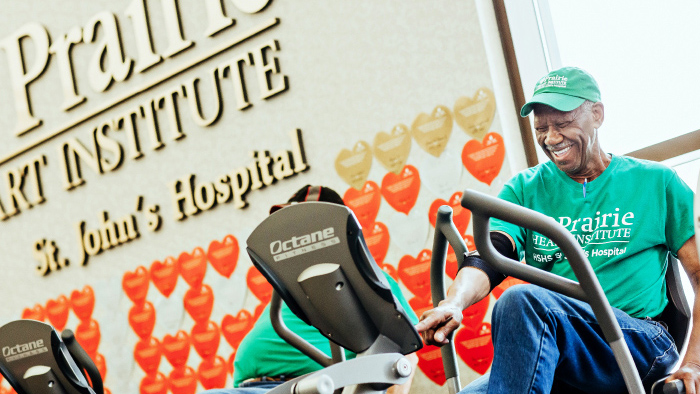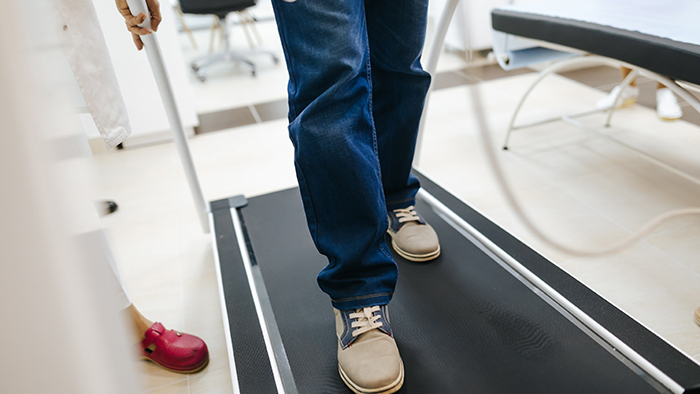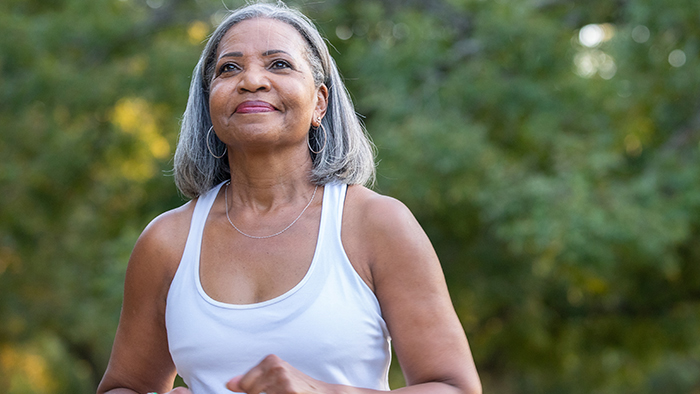- An individualized and personalized treatment plan, including evaluation and instruction on physical activity, nutrition, stress management and other health related areas.
- If you have one of the following diagnoses, you may be able to participate
- Heart attack
- Angina
- Cardiac surgery, such and coronary bypass or valve surgery
- Coronary artery stents
- Heart failure
- Generally covered by most health insurance companies but check your plan to determine copays or other requirements.
- The following CPT codes may be helpful when talking with your insurance company. 93798- Physician Services for outpatient cardiac rehabilitation; with continuous ECG monitoring (per session) 93797- Physician Services for outpatient cardiac rehabilitation; without continuous ECG monitoring (per session)
Cardiac Rehab
Exercise is often prescribed for patients recovering from many cardiac conditions

Take a step in the right direction and choose Prairie Heart Institute at HSHS St John’s Hospital to care for your cardiovascular needs. Here at Prairie Heart, we recognize the importance of exercise and the need for patient education. Ensuring patients have all the information they desire about their treatment plan aids in prevention of future heart events.
Our expert team of healthcare professionals offer a friendly, clean, and caring environment so you can improve the quality of your life. We tailor each phase of our program to meet your individual needs.
The Cardiac Rehab Department is located on the first floor of the Prairie Heart Institute at HSHS St John’s Hospital. Available equipment includes: recumbent elliptical machines, stationary bikes, treadmills, elliptical machines, nu-steps, air dyne bikes, arm ergometers, hand weights, balance pads and Star Trac weight machines.
Patients must be referred for our program by a physician. For more information, call 217-535-3990

What is cardiac rehabilitation?

What are the benefits of cardiac rehabilitation
- Live longer and lessen your chances for another heart attack
- Control heart disease symptoms such as chest pain or shortness of breath
- Stop or reverse damage to the blood vessels in your heart
- Lessen the physical and emotional aspects of heart disease
- Improve your stamina and strength, getting you back to your usual activities, including work, hobbies, and regular exercise
- Opportunity to meet and share stories with other patients like you
- Improved communication with your doctor and other healthcare providers about your progress following your cardiac event.
- Improve your confidence and well-being
- Recent studies have shown that people who complete a cardiac rehab program can increase their life expectancy by up to five years.
Phases of cardiac rehabilitation
Education topics include risk factors, exercise METs, exercise prescription, decreasing sugar intake, stress management, low sodium eating, building a heart healthy plate, blood pressure, goal setting, portion distortion, sleep health, and medications.
Appointments with a registered dietician and a wellness coach are also available. Staff members also introduce you to ways to develop a home exercise program to prevent future heart problems.
Healthy Hearts Program
Healthy Hearts meets 2-3 times a week.The goal of this program is to provide an opportunity to maintain or improve cardiovascular fitness, joint flexibility, muscular strength, and endurance through exercise. You will learn about physical activity and other elements of a healthy lifestyle. The atmosphere is casual and non-competitive.
All activity is supervised by an exercise physiologist/specialist. Your medical history is reviewed so the appropriate exercise can be given to meet your fitness needs. All exercise prescription follows recommendations of the American College of Sports Medicine. Blood pressures, heart rate and rhythm can be monitored as necessary.
This is a self pay program, monthly costs may be reimbursed to you by certain insurance companies. We encourage you to contact your insurance company to check if you are eligible for reimbursement.
For questions about the Healthy Hearts Program, please call 217-535-3990.
More cardiac rehab programs
SET for PAD | Outpatient program
This program is focused on improving your walking distance and quality of life. You may be eligible for this program if you have symptoms of claudication. Claudication is pain/discomfort in your legs when walking. SET involves the use of intermittent walking exercise, which alternates periods of walking just beyond the onset of pain with periods of rest. The exercise staff individualizes your settings and workloads based on your ability and gradually increases as you get stronger. Various educational topics are also discussed machine side.
SET for PAD is covered by Medicare. Some other insurance companies may also cover this program, we encourage you to contact your insurance company to determine your coverage. Up to 36 sessions over a 12-week period are covered.
The following CPT code may be helpful information when talking with your insurance about coverage. 93668-Peripheral Artery Disease (PAD) rehabilitation, per session.
Pulmonary Rehab | Phase III
This program provides supervised exercise and monitoring for patients affected by pulmonary disease. An Exercise Physiologist/ Specialist is available to provide oxygen monitoring and other needed supervision. The activities are designed to help you become more independent and responsible for your own exercise. This is a self-pay program; cost is not covered by insurance.
This class meets every Monday, Wednesday and Friday at 1:00pm.